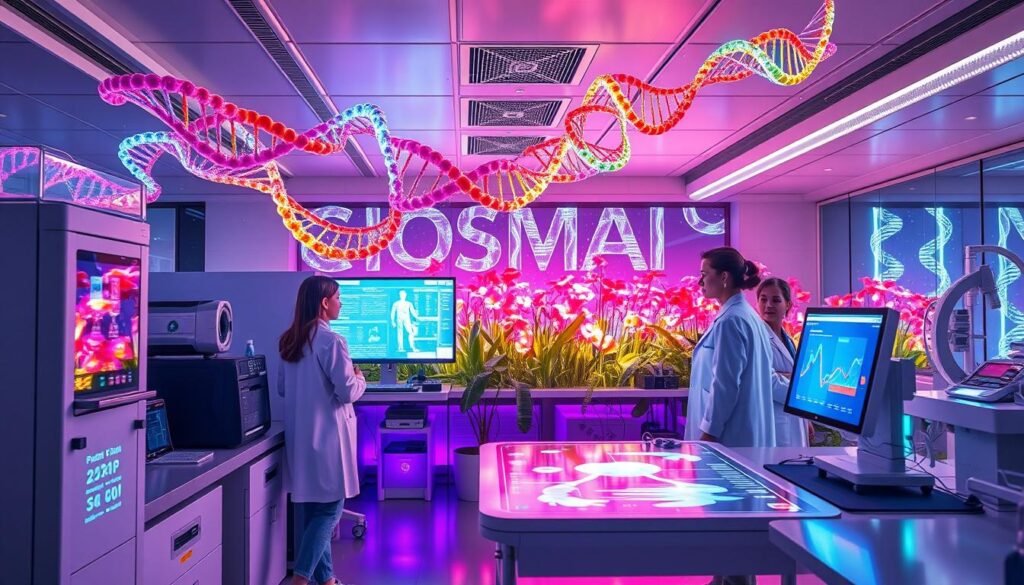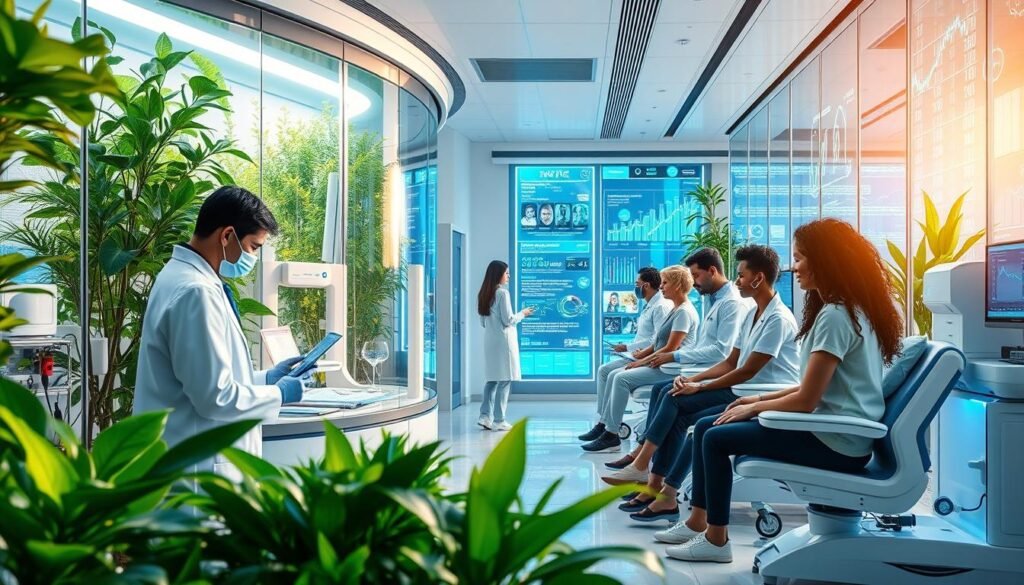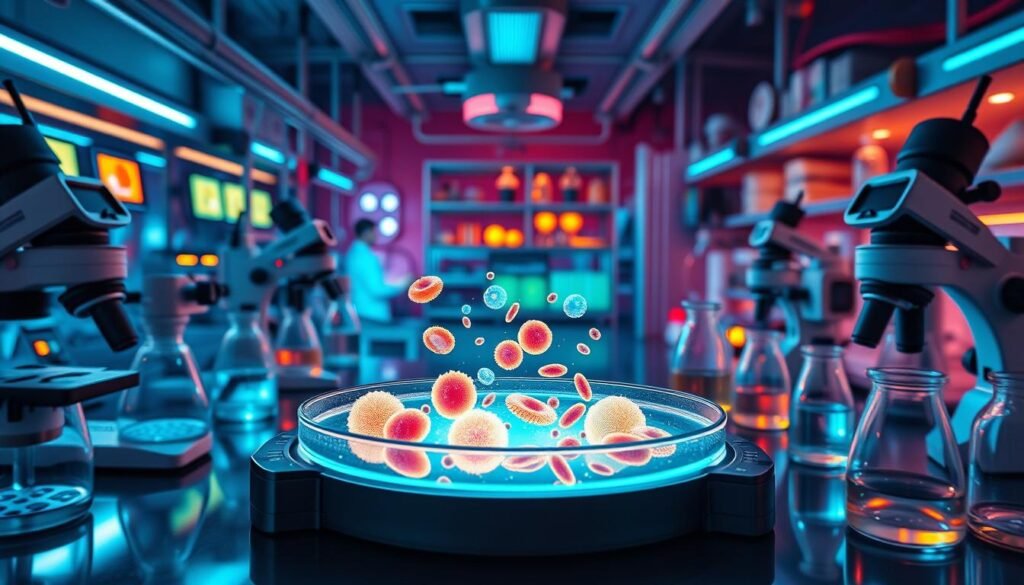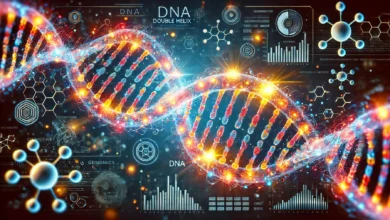Biotech Innovations with Healthcare Systems
The world of healthcare is changing fast, thanks to biotechnology. It’s making a big difference in how we diagnose and treat diseases. Things like artificial intelligence and gene editing are leading the way in this change.
This article looks at how biotech is changing healthcare. We’ll talk about the big moments, the key players, and where biotech stands today. You’ll see how biotechnology is making healthcare better and more personal for everyone.
Key Takeaways
- Biotechnology is transforming the healthcare industry with innovations in AI-driven diagnostics, precision medicine, and gene editing.
- Advancements in genetic testing and targeted therapies are revolutionizing personalized treatment plans for patients.
- Regenerative medicine and stem cell therapies offer promising new treatment options, while nanotechnology is enhancing medical interventions.
- Biotech innovations are driving cost-effective and integrated healthcare delivery models, with a focus on preventive care and predictive analytics.
- The future of healthcare is closely intertwined with the ongoing progress and investment opportunities in the biotech industry.
The Evolution of Biotechnology in Modern Medicine
The field of biotechnology has seen a huge change, shaping modern medicine. It has made many groundbreaking discoveries and helped big pharmaceutical companies grow. This has greatly impacted healthcare around the world.
Historical Milestones in Biotech Development
The start of biotechnology goes back to the 1970s. Scientists then cloned a gene and created recombinant DNA technology. This led to big steps in genetic engineering and new treatments.
- 1973: Stanley Cohen and Herbert Boyer did the first gene cloning experiment.
- 1982: The FDA approved the first drug made from recombinant DNA, human insulin, by Genentech.
- 1990: The Human Genome Project started, helping with personalized medicine.
Key Players Shaping the Biotech Landscape
Many pharmaceutical companies and research places have shaped biotechnology. Genentech, Amgen, and Biogen are among the leaders. They have helped create new treatments based on biotechnology.
| Company | Key Achievements |
|---|---|
| Genentech | They made the first drug from recombinant DNA, human insulin, and started using monoclonal antibodies for cancer. |
| Amgen | They introduced Epogen, the first genetically engineered protein drug for anemia, and have grown in many areas. |
| Biogen | They focused on treatments for neurological and autoimmune diseases, like Avonex for multiple sclerosis. |
Current State of Biotech Integration
Today, biotechnology is a big part of healthcare. It affects many areas of medical treatment and disease management. From personalized treatments to gene editing, biotech keeps pushing the limits of medicine.
“Biotechnology has the potential to unlock new frontiers in healthcare, from targeted therapies to preventive solutions. As the industry continues to evolve, we can expect even more transformative advancements in the years to come.”
Artificial Intelligence and Machine Learning in Healthcare Diagnostics
The healthcare world is changing fast, thanks to artificial intelligence (AI) and machine learning (ML). These technologies are making a big difference in how doctors diagnose and treat patients. They help analyze lots of data, like medical images and patient records, to make diagnoses more accurate and help patients get better faster.
AI is especially useful in looking at medical images. AI algorithms can quickly and accurately review scans like X-rays and MRIs. Companies like IBM Watson Health and Google DeepMind have created AI systems that can spot problems in images that humans might miss.
- AI can look at medical images much faster than humans, helping doctors make quicker decisions.
- ML models can find some cancers, like breast and lung cancer, as well as or better than doctors.
- AI virtual assistants can help sort out patient symptoms and give advice on what to do next.
AI and ML are also changing other parts of healthcare diagnostics. They can look through huge amounts of patient data to find patterns and predict health risks. This helps doctors create treatment plans that are just right for each patient. By using AI in healthcare and machine learning diagnostics, doctors can make better choices, leading to better health outcomes and better use of medical imaging.
| AI-Powered Diagnostic Applications | Potential Benefits |
|---|---|
| Medical image analysis | Faster diagnosis, improved accuracy, and early detection of diseases |
| Predictive analytics | Personalized treatment plans, risk assessment, and preventive care |
| Virtual assistants and chatbots | Improved triage, symptom management, and patient engagement |
Precision Medicine: Revolutionizing Patient Treatment
Precision medicine is changing healthcare fast. It uses genetic profiling and targeted therapies. This new field offers more personalized and effective care.
Genetic Testing and Personalized Treatment Plans
Genetic testing is key in precision medicine. It helps doctors create treatment plans based on a patient’s genes. This way, treatments are more likely to work and have fewer side effects.
Targeted Therapies in Cancer Treatment
Targeted cancer therapies are a big step forward. They focus on the genetic causes of cancer. This approach has shown great results, improving patient outcomes and reducing side effects.
Pharmacogenomics Applications
- Pharmacogenomics studies how genes affect drug responses.
- It helps doctors find the best drug doses for each patient. This makes treatments safer and more effective.
- Pharmacogenomics could change how we manage medications. It ensures patients get the right drug for their genes.
As precision medicine grows, it promises to change healthcare. It will bring more targeted and effective treatments. This could greatly improve patient outcomes and quality of life.

“Precision medicine is not the future – it’s the present. By harnessing the power of genetic profiling and targeted therapies, we are ushering in a new era of personalized healthcare that is transforming the way we approach patient treatment.”
Gene Editing Technologies Transforming Treatment Options
The field of biotechnology has seen a big change with the arrival of gene editing technologies like CRISPR-Cas9. These tools are helping researchers and doctors find new ways to treat genetic disorders. They are leading to big steps forward in personalized medicine.
CRISPR technology is very promising for treating many genetic disorders. It can precisely change DNA sequences. This has shown great results in clinical trials for sickle cell disease, hemophilia, and Duchenne muscular dystrophy. It could offer long-term, possibly life-changing treatments for these diseases.
Gene therapy, which adds genetic material to cells to treat or prevent disease, has also made big strides. Better vector design and delivery methods have made gene therapy safer and more effective. This opens up new ways to treat genetic disorders, cancers, and infectious diseases.
| Genetic Disorder | CRISPR-Based Treatment | Current Status |
|---|---|---|
| Sickle Cell Disease | Correction of sickle cell mutation in hematopoietic stem cells | Ongoing clinical trials showing promising results |
| Hemophilia B | Gene editing to restore factor IX production | Phase 3 clinical trials underway |
| Duchenne Muscular Dystrophy | Correction of dystrophin gene mutations | Preclinical research and early-stage clinical trials |
As gene editing technology grows, the chance to tackle many genetic disorders looks brighter. The mix of CRISPR and gene therapy is changing how we treat diseases. It brings hope to patients and their families who have faced the challenges of inherited conditions.
“The ability to correct underlying genetic defects holds the promise of providing long-term, potentially curative solutions for patients suffering from these debilitating genetic disorders.”
How Biotech Innovations Are Changing Healthcare Systems
The healthcare industry is changing fast, thanks to biotechnology. These new technologies are making healthcare more personal, affordable, and high-tech.
Impact on Healthcare Delivery Models
Biotech has led to personalized medicine. This means treatments are made just for you, based on your genes and health history. It helps doctors make better diagnoses and treatments, leading to better health for patients.
Healthcare providers are using technology integration to improve care. They’re making operations smoother, engaging patients more, and giving care that flows well.
Cost-Effectiveness Analysis
Now, healthcare transformation and medical cost reduction are key for healthcare. Biotech can help find diseases early, prevent them, and treat them more efficiently. But, starting these new technologies can be expensive, so careful planning is needed.
System Integration Challenges
- Seamless integration of new biotechnologies into existing healthcare infrastructure
- Overcoming interoperability issues and ensuring data compatibility across different systems
- Addressing regulatory and privacy concerns related to the use of sensitive patient data
- Providing comprehensive training and support for healthcare professionals to effectively utilize these innovations
As healthcare keeps evolving, using biotech well is key. It’s important to overcome challenges to offer top-notch, affordable, and focused care. Everyone must work together to make sure these new healthcare transformation tools work as they should.

Digital Health Platforms and Telemedicine Advancement
The healthcare world has changed a lot with digital health platforms and telemedicine. These new technologies make it easier for patients to get medical care. They offer more convenience, efficiency, and access.
Telehealth is a big step forward. It lets doctors do remote consultations and assessments. Patients can talk to their doctors from home, cutting down on in-person visits.
Remote patient monitoring systems are also changing the game. They let doctors track patients’ health data in real-time, even when patients aren’t in the hospital. This technology helps catch diseases early and manage chronic conditions better.
Digital health apps are making healthcare more personal and accessible. These apps help people track their health and fitness. They connect patients with healthcare providers, encouraging better health habits.
The future of healthcare looks bright with digital health and telemedicine. These technologies promise to make healthcare better for everyone. They could lead to better patient experiences and outcomes.

“The COVID-19 pandemic has accelerated the adoption of telehealth, remote patient monitoring, and digital health apps, demonstrating their transformative potential in healthcare.”
Regenerative Medicine and Stem Cell Therapies
Regenerative medicine has seen big leaps forward lately. This is thanks to stem cell research and tissue engineering. These advances are changing how we treat medical issues, giving hope to patients and changing healthcare.
Tissue Engineering Breakthroughs
Tissue engineering is a big deal in regenerative medicine. Scientists have found new ways to grow and fix damaged tissues. This includes making 3D-printed organs and using special materials and structures.
These new methods could help solve many medical problems. This includes fixing damaged organs and repairing muscles and bones.
Clinical Applications and Success Stories
Regenerative medicine and stem cell therapies have shown great results in real-world use. They’ve helped with heart disease, spinal cord injuries, and some cancers. For example, stem cell treatments have helped improve heart function and lower heart failure risk in heart disease patients.
Also, new tissue engineering has led to implants that can grow new tissues. This gives hope to those needing organ transplants or new limbs.
| Condition | Regenerative Medicine Approach | Success Rate |
|---|---|---|
| Spinal Cord Injury | Stem cell-based therapies | 60% improvement in motor function |
| Cartilage Damage | Tissue engineering with biomaterials | 75% reduction in pain and improved joint function |
| Heart Failure | Stem cell-based cardiac repair | 40% improvement in ejection fraction |
These successes show how regenerative medicine and stem cell therapies can change medicine. They can help with many health issues, from organ transplants to treating serious injuries and chronic diseases.

Nanotechnology Applications in Medical Treatment
Nanotechnology in medicine, or nanomedicine, is a fast-growing field. It’s changing how we tackle medical problems, from delivering drugs to making diagnostic tools.
Targeted drug delivery systems are a big leap forward in nanomedicine. Tiny particles like liposomes and polymeric micelles can carry drugs to exact spots in the body. This reduces side effects and makes treatments more effective.
- Nanoparticles can be made to find and attack tumor cells, leading to better cancer treatments with less harm to healthy tissues.
- These systems can also get drugs past the blood-brain barrier. This opens up new ways to treat brain disorders.
Nanorobots are another exciting area in nanomedicine. These tiny robots, made from materials like carbon nanotubes or DNA, can do small, precise medical tasks. They can clear blockages in blood vessels or deliver specific treatments.
| Nanomedical Applications | Benefits |
|---|---|
| Targeted Drug Delivery | Improved treatment efficacy, reduced side effects |
| Nanoparticle-based Diagnostics | Early disease detection, personalized medicine |
| Nanorobotic Interventions | Minimally invasive treatments, enhanced surgical precision |
The future of nanomedicine looks very promising. It could change healthcare a lot. With nanotechnology, we might see better treatments and more accurate diagnoses. This could greatly improve patient care and change how we think about healthcare.
Biotech’s Role in Preventive Healthcare
Biotechnology is changing healthcare by focusing on prevention. It uses advanced tools for early detection and predictive analytics. This helps people take care of their health early, leading to better health and lower costs.
Early Disease Detection Systems
Biotechnology has changed how we find health problems. It uses genetic testing and biomarkers to spot diseases early. This means doctors can act fast and prevent serious problems.
Predictive Analytics in Healthcare
Predictive analytics use AI and machine learning to understand health risks. They look at lots of data, like genes and lifestyle, to predict health problems. This helps people stay healthy and avoid serious conditions.
| Preventive Healthcare Approach | Key Benefits |
|---|---|
| Early Disease Detection Systems | – Identify health issues at the earliest stages – Facilitate timely intervention and preventive measures – Improve treatment outcomes and recovery rates |
| Predictive Analytics in Healthcare | – Assess individual health risks based on comprehensive data – Empower individuals to take proactive steps to maintain wellness – Reduce the incidence of serious health conditions |
Biotechnology is making healthcare better by focusing on prevention. It helps find diseases early and assess health risks. This lets people take charge of their health and look forward to a healthier future.
Regulatory Framework and Ethical Considerations
The biotech industry is changing healthcare fast. It’s important to understand the rules and ethics involved. The United States Food and Drug Administration (FDA) is key in checking if new products are safe and work well.
The FDA checks clinical trials to see if new biotech products are safe and effective. This includes gene editing and stem cell treatments. They aim to help new ideas grow while keeping patients safe.
New technologies like CRISPR-Cas9 and stem cell research bring up big ethical questions. These questions are changing how we think about rules in biotech.
It’s important for everyone to talk about FDA regulations and bioethical issues. We need to make sure biotech grows in a way that’s good for patients and follows ethical rules.
| Regulatory Aspect | Key Considerations |
|---|---|
| FDA Approval Process | Rigorous clinical trials, safety and efficacy evaluation, patient protection |
| Ethical Considerations | Gene editing, stem cell research, patient privacy, equitable access |
| Industry-Government Collaboration | Balancing innovation and regulation, policy development, stakeholder engagement |
“The rapid advancements in biotechnology have created a pressing need for a robust regulatory framework that fosters innovation while prioritizing patient safety and ethical considerations.”
Future Prospects of Biotech in Healthcare
The biotechnology industry is growing fast, with new technologies and investment chances ahead. Biotech startups and big players are exploring new medical areas. This is changing healthcare quickly.
Emerging Technologies and Trends
New advancements in 3D bioprinting, synthetic biology, and gene editing are changing healthcare. 3D bioprinting could make custom tissue and organ implants. Synthetic biology aims to create living cells for new therapies.
Gene editing, like CRISPR, lets us make precise genetic changes. This could help treat many genetic diseases.
Investment Opportunities and Market Growth
Investors are interested in biotech startups and healthcare innovation. The global healthcare innovation market is growing fast. The biotech sector is leading this growth.
This increase in investment is helping create new treatments, diagnostics, and devices. These could greatly improve patient care.
Biotechnology is key to the future of medicine. It’s bringing new treatments and diagnostic tools. Biotech startups and innovation are set to benefit patients and healthcare systems worldwide.
Economic Impact of Biotech Innovations
The healthcare sector has long been a key driver of economic growth. The rise of biotech innovations has made this trend even stronger. The biotech industry’s growth is deeply affecting healthcare economics.
One big economic benefit of biotech is its ability to lower medical costs. Advanced diagnostic tools and targeted therapies from biotech can make healthcare more efficient and affordable. This leads to better healthcare delivery, benefiting patients and governments alike.
| Metric | Biotech Industry Growth | Potential Cost Savings |
|---|---|---|
| Global Biotech Market Size | $749.5 billion (2021) | N/A |
| Projected CAGR (2022-2030) | 15.83% | N/A |
| Projected Global Healthcare Cost Savings | N/A | $100 billion annually by 2025 |
The biotech industry also creates a lot of jobs and boosts local economies. Biotech companies need skilled workers in many areas, from research to production. This creates jobs that help the economy grow and improve healthcare economics.
“Biotech innovations have the potential to transform healthcare systems, improving patient outcomes while also driving economic growth and cost savings for governments and healthcare providers.”
As biotech continues to grow and introduce new technologies, its impact on healthcare economics will only get stronger. It’s becoming a crucial part of modern healthcare systems.
Conclusion
The biotech revolution has changed healthcare forever. It has brought new ways to care for patients. Advances in AI, precision medicine, gene editing, and regenerative therapies are just the start.
Looking forward, these innovations will make healthcare better. They will make it more efficient, effective, and personal. Healthcare will become more tailored, affordable, and accessible to everyone.
Despite challenges in rules and ethics, the drive to innovate will keep growing. This will open up new possibilities in medicine. The future of healthcare looks bright, with a focus on patients, technology, and prevention.
FAQ
What are the key historical milestones in the development of biotechnology?
Biotechnology has a rich history. Key milestones include the discovery of DNA’s structure in 1953. The 1970s saw the development of recombinant DNA technology. The 1980s brought monoclonal antibodies, and 2003 marked the Human Genome Project’s completion.
This paved the way for personalized medicine and gene editing advancements.
How are AI and machine learning transforming healthcare diagnostics?
AI and machine learning are changing healthcare diagnostics. They improve medical image analysis accuracy and predict patient outcomes. Companies like IBM Watson Health and Google DeepMind are leading these changes.
What is precision medicine, and how is it changing patient treatment?
Precision medicine tailors treatments to an individual’s genetic profile. This approach enables targeted therapies and reduces side effects. It includes genetic testing and breakthrough cancer therapies like CAR-T cell therapy.
Pharmacogenomics also helps optimize drug efficacy.
How are gene editing technologies, such as CRISPR, transforming treatment options?
Gene editing technologies like CRISPR-Cas9 are changing medicine. They offer new ways to treat genetic disorders and develop therapies. This technology is unlocking new possibilities in healthcare.
What are the challenges in integrating biotechnology innovations into healthcare systems?
Integrating biotechnology innovations into healthcare systems is challenging. It requires ensuring cost-effectiveness and addressing regulatory frameworks. Overcoming barriers to adoption and interoperability is also crucial.
How are digital health platforms and telemedicine impacting healthcare delivery?
Digital health platforms and telemedicine are improving healthcare. They make healthcare more accessible and efficient. They enable remote monitoring and virtual consultations, enhancing patient engagement.
What are the advancements in regenerative medicine and stem cell therapies?
Regenerative medicine has made significant progress. It includes tissue engineering and stem cell therapies. These advancements offer promising solutions for organ transplantation and tissue repair.
How is nanotechnology being applied in medical treatment?
Nanotechnology is transforming medical treatment. It includes targeted drug delivery systems and nanoparticle-based diagnostics. Nanorobots may soon enable minimally invasive interventions, leading to more effective therapies.
What are the ethical considerations surrounding biotechnology innovations in healthcare?
The ethics of biotechnology include regulatory frameworks and concerns about gene editing and stem cell research. It’s important to balance innovation with patient safety and privacy.
What are the emerging trends and investment opportunities in the healthcare biotechnology sector?
The healthcare biotechnology sector is growing rapidly. Trends include 3D bioprinting, synthetic biology, and the rise of startups and venture capital. These developments offer many investment opportunities in medical innovation.




